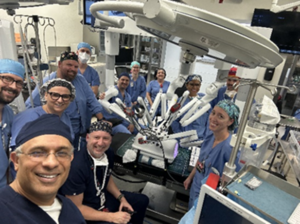Pioneering new robotic treatment for atrial fibrillation

Atrial fibrillation (Afib) affects over 2.7 million Americans. Until recently, treatment options have been limited. HonorHealth is proud to have an elite cardiovascular program at the forefront of pioneering new robotic procedures to treat Afib.
This past month, Zain Khalpey, MD, cardiac surgeon at HonorHealth, and his multidisciplinary team achieved a major milestone, performing their 100th convergent robotic procedure for Afib. This team is one of the first in the western U.S. to use a new robotic approach and ablation catheter which allows for a more thorough ablation and faster recovery.
The novel procedure involves making three 8mm and one 12mm incisions on the left chest to insert robotic ports. Dr. Khalpey first performs a 3D electrophysiological mapping of the heart to identify arrhythmia triggers. He then uses a flexible ablation catheter to deliver more precise lesions during ablation to disrupt abnormal electrical pathways causing Afib.
In the same procedure, the team robotically places a clip on the left atrial appendage to reduce stroke risk from blood clots. All this is done in under two hours. Patients can typically go home the next day without driving restrictions.
“We are extremely proud to be one of the first centers in the world pioneering and developing this new fully robotic ablation technique,” says Dr. Khalpey. “By combining procedures and using the latest technologies, we can dramatically improve outcomes and quality of life for Afib patients.” Dr. Khalpey’s father and brother had atrial fibrillation which inspired him to pioneer this program.
Please join us in congratulating Dr. Khalpey and his robotic team at HonorHealth Deer Valley and Scottsdale Shea medical centers, Rahul Doshi, MD, and his electrophysiology team, Yoaav Krauthammer, MD, Imran Sheikh, MD, Ashish Gupta, MD, John Beshai, MD and Ashish Sadhu, MD, on achieving this significant milestone in advanced robotic cardiac care. Their work is helping set new standards for Afib treatment.
